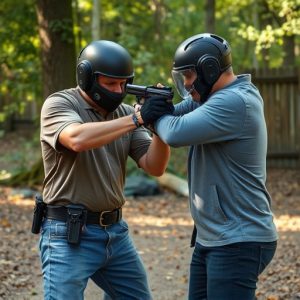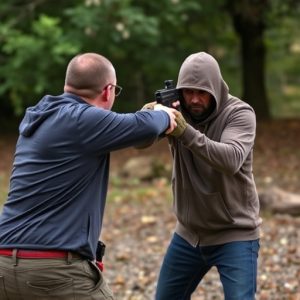Civilian Taser Ownership: State Laws, Requirements, and Restrictions Explored
Senior citizens considering stun guns for personal safety must navigate a patchwork of state laws an…….
Senior citizens considering stun guns for personal safety must navigate a patchwork of state laws and regulations that vary widely regarding age restrictions, permits, background checks, device registration, and allowed uses. When opting for top-rated stun guns designed for seniors, understanding these legal frameworks is crucial for both compliance and peace of mind. Features like ease of use, portability, and specific senior-focused licenses cater to the unique needs of aging individuals seeking self-defense options. Registration with local law enforcement is mandatory for many models, enhancing public safety while tracking device ownership. Awareness of prohibited areas and activities further ensures responsible stun gun usage in accordance with state laws.
“Uncovering the legal landscape of civilian taser ownership: A comprehensive guide to state laws. This article navigates the intricate web of regulations surrounding stun guns, offering insights into who can legally own a taser, age restrictions for senior citizens, and critical safety measures like background checks and registration. From understanding the legal framework to identifying common exclusions, we delve into the top-rated stun guns and their role in ensuring public safety, especially among our aging population.”
- Understanding Civilian Taser Ownership: A Overview of Legal Frameworks
- State-Specific Regulations: Who Can Own a Stun Gun?
- Age Restrictions: Are There Special Rules for Seniors?
- Background Checks and Licensing: Ensuring Safety and Responsibility
- Registration and Record Keeping: What You Need to Know
- Common Exclusions and Limitations: Where Can Tasers Not Be Owned?
Understanding Civilian Taser Ownership: A Overview of Legal Frameworks

In recent years, civilian tasers have gained significant attention as a personal safety tool, especially among seniors looking to protect themselves in various situations. Understanding the legal frameworks surrounding stun gun ownership is paramount for those considering acquiring one of these top-rated self-defense devices. Each state has its own set of regulations and requirements that dictate who can own, carry, and use a taser. These laws vary widely, affecting everything from background checks to age restrictions and permit systems.
For seniors interested in civilian tasers, it’s crucial to research their state’s specific laws. Some states allow open carry without a permit, while others mandate a concealed carry license or even require registration of the device. Certain regulations may also restrict the types of tasers available based on power output or design. Staying informed about these legal requirements is essential for ensuring compliance and peace of mind when owning and carrying a stun gun for personal safety.
State-Specific Regulations: Who Can Own a Stun Gun?

In the United States, the ownership of stun guns, or Tasers, is regulated at the state level, leading to a patchwork of laws and regulations across different states. This means that what applies in one state may not hold true for another when it comes to who can legally own a stun gun. State-specific rules determine age restrictions, permit requirements, and even the types of stun devices permitted.
For instance, some states allow only individuals aged 21 or older to possess a stun gun without a license or permit. Others might require a background check and registration for all stun gun owners, while a select few may issue permits exclusively to those in specific professions like law enforcement or security personnel. Senior citizens who are looking to protect themselves at home might find varying levels of accessibility depending on their state’s regulations, with some states having more inclusive policies regarding stun gun ownership.
Age Restrictions: Are There Special Rules for Seniors?

When it comes to civilian stun gun ownership, age restrictions are a critical consideration, especially for seniors who might have unique needs or challenges. While many states allow individuals aged 18 and above to purchase stun guns without significant restrictions, some have special rules in place for older adults. This is due to the understanding that senior citizens may require different levels of protection and self-defense strategies.
For instance, top-rated stun guns designed for seniors often prioritize ease of use and portability. These devices are typically smaller, lighter, and feature simple activation mechanisms to accommodate those with reduced dexterity or mobility issues. Some states even permit licensed firearms owners aged 65 or above to carry stun guns without a permit, recognizing the importance of self-defense as one ages.
Background Checks and Licensing: Ensuring Safety and Responsibility

Background checks and licensing are vital components in regulating civilian stun gun ownership, especially for top-rated stun guns that are easily accessible to seniors or anyone looking for personal protection. These measures ensure that individuals who purchase and carry such devices are responsible and reliable. A comprehensive background check helps prevent firearms from falling into the hands of those with a history of violence, mental health issues, or criminal records, thereby enhancing public safety.
Licensing requirements further add a layer of responsibility by mandating training and understanding of stun gun usage. This is particularly important for top-rated stun guns, as proper handling can significantly impact their effectiveness and potential risks. Licensing laws also facilitate the tracking and accountability of these devices, ensuring that they remain in the hands of authorized individuals who have undergone the necessary screening processes.
Registration and Record Keeping: What You Need to Know

When considering civilian taser ownership, one crucial aspect to understand is the registration and record-keeping requirements mandated by state laws. Unlike some popular stun guns for seniors, which can be purchased without extensive background checks, tasers often fall under stricter regulations due to their potential power and impact. Many states require individuals to register their tasers with local law enforcement agencies, providing detailed information about the device, its purchase, and user’s personal data.
This registration process serves as a critical tool for tracking stun gun ownership and ensuring public safety. It allows authorities to maintain records of who owns a taser, where it was purchased, and any associated permits or licenses. For top-rated stun guns targeted at seniors or individuals new to weapon ownership, understanding these registration mandates is essential to avoid legal complications and ensure responsible use.
Common Exclusions and Limitations: Where Can Tasers Not Be Owned?

In many jurisdictions, civilian taser ownership comes with significant exclusions and limitations, reflecting a delicate balance between personal protection and public safety. One of the most common restrictions is age; top-rated stun guns are typically prohibited for individuals below a certain age, often 18 or 21 years old. This regulation is in place to ensure that young people, who might lack maturity and understanding of the device’s potential consequences, do not acquire and use tasers irresponsibly.
Additionally, certain locations and settings are off-limits for taser ownership. For example, schools, universities, and government buildings often ban stun guns within their premises to prevent unauthorized use or misuse that could disrupt educational and public services. Similarly, air travel regulations strictly prohibit carrying tasers on planes due to security concerns. Even in areas where tasers are legal, specific activities like hunting or certain types of self-defense scenarios might be excluded from civilian ownership, as these contexts can easily escalate into dangerous situations requiring professional law enforcement intervention.
In exploring the civilian taser ownership landscape, it’s clear that state laws vary widely regarding who can legally possess these devices. From age restrictions for top-rated stun guns to robust background check requirements, understanding these regulations is paramount for responsible ownership. While seniors may face unique considerations, the key lies in adhering to local rules, proper registration, and maintaining thorough records. By doing so, citizens can ensure they’re acting within legal boundaries while keeping their communities safe.


